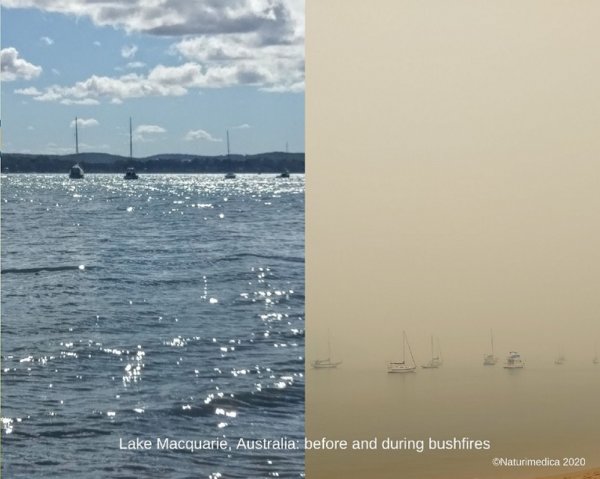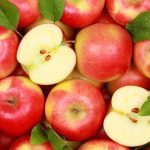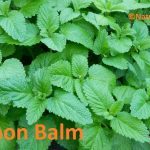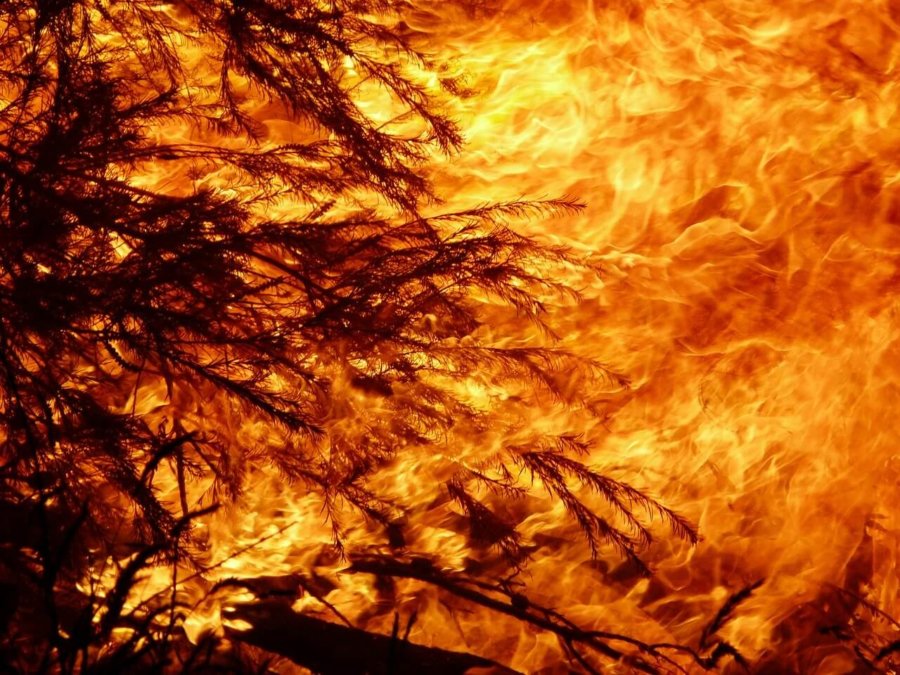As I write this, we’re in the midst of devastating bushfires here in Australia that’ve been continuing for many months now. Even people living far away from the fires or along the coast close to water have been impacted by the smoke and dust as it travels across the land. This resulted in wide-spread bushfire smoke inhalation health concerns that need to be addressed as soon as possible.
Additionally, the emotional aspects and distress felt because of the fires causing such a widespread damage to peoples’ livelihoods and the environment, are taking an enormous toll on the population.
I’ve been personally affected by the smoke and dust from the wildfires as I live in a bushfire prone area, and felt many detrimental effects of them on my health. I stayed indoors for days or even weeks and when I went out, the visibility was restricted to 10 meters on some days due to the thick smoke haze – I couldn’t see my neighbour’s house across the road for a good while!
See the neighbourhood photos below to get an idea on how bad it’s been and the very poor air quality we’ve had during these intense fires.

During this time of great need, I put together an emergency and/or recovery bushfire smoke inhalation health kit for myself as well as my clients and neighbours. I’d like to share it with you too in the hope it’ll help you cope better with the challenging conditions and circumstances, and support your health and wellbeing.
This post covers the most effective and tested natural methods I found to reduce a personal exposure to bushfire smoke and dust, plus the best natural remedies to recover from bushfire smoke inhalation side-effects. These recommendations and tips can be applied anywhere in the world with great results guaranteed!
You’ll find a free PDF summary of all recommendations at the end of my post.
So, let’s get started.
How to reduce your exposure to bushfire smoke
Overall, healthy people can tolerate short periods of smoke exposure quite well. However, those with pre-existing lung or heart conditions, children, pregnant women, and the elderly are more likely to be negatively affected by smoke and dust. Therefore, please seek immediate medical advice if you have trouble breathing or fall in one of the higher risk groups mentioned above.
Here are my key recommendations
- Stay indoors as much as possible and close all windows and doors. Make sure the house is well-sealed which can largely prevent the smoke particles getting into the home.
- Take off your shoes and leave them outside, ideally in a closed box. Change your clothes when you get home and wash them.
- Take a shower and wash your hair after being outside.
- Remember about the animals, too. Rinse dogs off with water after a (short) walk and keep cats or birds inside.
- Avoid exercising outdoors and go easy on exercising indoors, too. Deeper and faster breathing during exercise will significantly increase your exposure resulting in more negative health effects.
- Set an air conditioner to the recycle mode so there is no outside air brought in. You can also install a special filter to remove much of the harmful particles.
- Add a few more plants to your home especially in bedrooms to reduce air pollution and increase oxygen. Some of the plants that cleanse the air well and are easy to care for are: peace lilies (Spathiphyllum), snake plant (Sansevieria trifasciata), golden pothos (Epipremnum aureum).
- When the air quality in your home gets worse, consider relocating (even for a short period of time) to a cleaner, air conditioned environment like a shopping centre or stay with family members who have a good air conditioning system.
- Invest in a high efficiency particle air filters (HEPA filters). It will significantly reduce your personal exposure to particle concentrations indoors when there’s a high level of bushfire smoke.
HEPA filters trap dust, pollen, mould, droppings from dust mites, pet dander and tobacco particles. They are often used by allergy and asthma sufferers. According to Honeywell, a high-quality HEPA filter that can trap 99.97% of dust particles that are 0.3 microns in diameter. For comparisons sake, a human hair is about 50 to 150 microns in diameter.
- Use appropriate face masks when going out – ask your pharmacist for the right type tailored to your circumstances.
Find out more about bushfire smoke inhalation and what to do to minimise its effects HERE.
How to tell if the smoke is affecting you
Smoke from bushfires can irritate the eyes, the respiratory system and worsen chronic heart and lung diseases. Major symptoms include:
- Difficulty breathing
- Irregular heartbeat
- Stinging or itchy eyes
- Runny nose
- Flared up sinuses
- Irritating cough
- Sore throat
- Headaches
- Nausea
- Fatigue
What can you do to minimise the effects of bushfire smoke inhalation
It’s always important to support the body during and after any smoke exposure, especially if the wildfires last for a long time (days, weeks or months). There is no research studies on the subject as yet, but there may be unforeseen long-term health consequences from the prolonged exposure as discussed HERE.
Therefore, I recommend you take the time to support the healing and detox abilities of the body as much as possible, to be able to remove the toxic particles in time. Supporting the lungs, the gut and the liver should be the top priority during this time, using nutrition, herbs, supplements and proper hydration, to prevent or reverse the adverse effects.
Most respiratory issues increase because the smoke and dust from the bushfires are highly inflammatory and irritating to the airways. We often can’t stop the fire and need to leave the area, but we CAN significantly reduce respiratory and other discomforts using healing foods, herbs, supplements and other homemade remedies to support the body.
If you are currently dealing with the smoke from the bushfires or live in a city or area affected by the air pollution from the smoke and dust, these simple natural remedies will help you with lowering inflammation, supporting the immune system and repairing the respiratory system.
Please note that the remedies mentioned below are not suitable for people with existing lungs/respiratory and heart conditions as first aid or to start with, as advised above. However, the remedies can be effectively used in aiding recovery later on, subject to your doctor’s directions and recommendations.
My top 7 natural remedies for bushfire smoke inhalation
- Taking extra antioxidants is very important – when the pollution from the bushfires is at toxic levels, the body is working hard to neutralise free radicals produced and to remove toxins. Colourful fruits and vegetables contain high levels of most antioxidants needed – the more colour and more variety the better. Aim for 2 fruits and 6 cups of rainbow coloured vegetables per day, ideally organic to decrease toxic load.

Vitamin C is an easy to get, fantastic antioxidant that supports the immune system and improves its response, thus reducing reactions to smoke and other toxins. It’s also a natural anti-histamine decreasing runny nose, itchy eyes or coughs. It’s found in citrus fruits, kiwi fruits, berries, capsicum and leafy greens. In addition to vitamin C from food, I also recommend taking a good quality supplement to help the body to cope better and recover faster. Suggested dose: around 3-4 g per day in divided doses e.g. 1g of vitamin C 3-4 times per day.
- Pineapple and papaya – these fruits contain proteolytic (protein breaking) enzymes that break down mucus in the respiratory tract easing congestion and helping detoxification. Thick mucus is produced by the body as protection in response to inhalation of toxic particles from the fires (it literally is a particle trapping mechanism). Enzymes present in pineapple and papaya decrease the viscosity of the mucous and help to clear it faster, facilitating the necessary tissue detox and decreasing inflammation.
It’s important to eat these fruits fresh and on their own between meals, otherwise the enzymes will break down proteins in foods instead of targeting the removal of the post smoke inhalation debris.
For maximum benefit, I suggest you also consume the pineapple core as most of the proteolytic enzymes (bromelains in particular) are present there. It’s really quite tasty!
- Increase anti-inflammatory foods high in quercetin, a flavonoid and antioxidant which reduces allergy reactions and inflammation related to smoke or dust, or any other histamine-mediated reactions. These include red grapes, onion, apples, cranberries, spinach, red capsicums and green tea. Again, it’s well-worth taking quercetin as a supplement to up the body defences, with a daily intake between 800-1,200mg.

Also, increase intake of other anti-inflammatory foods. These include turmeric, ginger, olive oil, walnuts, leafy greens, beetroots and good quality fish oils (eating fish is problematic nowadays, in my opinion, because of the pollution and plastics floating in the oceans or feeding the farmed fish GMO foods and antibiotics).
- Herb thyme – thyme works very well for any kind of congestion, it contains an ingredient called ‘thymol’ which is strongly anti-inflammatory, antiseptic and antibacterial. It reduces mucus in the airways which accumulates in response to the polluted, smoky air. Thyme also has an antispasmodic action helping with relaxing constricted and inflamed airways, and thus adding breathing.
Add thyme to salads or soups, or best have it as a tea. Method: steep a small handful of thyme in boiling water and cover for 5-10 minutes, then strain and drink throughout the day. You can add a little raw honey (such as Manuka honey) for improved taste and additional throat-soothing and immune boosting benefits. You can make a bigger portion and store any leftover tea in the fridge for up to 24 hours. Reheat as needed.
Thyme can also be used as a gargle, or as a steam bath (it’s great for sinuses, too). Simply add some fresh or dried thyme to a bowl of hot water, cover your head with a towel, and breathe in for a few minutes to moisten the airways. Make sure the water it’s not too hot, though! You can also use a drop or two of thyme essential oil for the steam bath.
- Water – staying well-hydrated and lubricating the mucous membranes is very important to soothe and moisten tissues. Dehydration affects the whole body, and the delicate mucus membranes in the lungs are particularly vulnerable. Importantly, water helps to remove the microscopic particles from the smoke that are trapped in the lungs and sinuses.

Drink at least 8-10 glasses of filtered water per day and also add green vegetable juices and herbal teas such as rosehip (high in vitamin C), chamomile (gut and stress support) or nettle (natural anti-histamine and anti-inflammatory). Avoid coffee, black tea, alcohol or soft drinks, as they all have dehydrating properties i.e. remove water from the body.
- Probiotics for immune system support – around 70% of the immune system is located in and around the gut. When over-taxed and hyper-sensitive, the immune system reacts to triggers such as smoke and dust by creating inflammation and pain as defence mechanisms. Foods containing probiotics will help support and calm the immune system and enhance detoxification. These include fermented vegetables, sauerkraut, kefir, yoghurt as well as specific probiotics from supplements (talk to your health practitioner about the most appropriate ones for you).
Key foods supporting the immune system include foods high vitamins C (see above), vitamin A (eggs, organic butter, cod liver oil), zinc (oysters, seafood, animal proteins), eggs (high in protein, vitamins and minerals), garlic, broccoli, mushrooms, turmeric and bone broths.
Increased intake of fibre is also highly recommended as it helps with detoxification by binding the toxins in the gut and safely escorting them out of the body.
- Herbs and foods supporting the nervous system – needless to say, stress reduction is a vital component of any post smoke inhalation support. They include: good nutrition as mentioned above, sleep support (see my better sleep tips HERE), B vitamins, vitamin C, as well adrenal herbs such as holy basil and withania, and nervous system supporting herbs including passion flower, valerian, kava, chamomile or lemon balm.

Herbs are powerful natural medicines and I always recommend you consult with a herbalist or a naturopath before taking herbs in any form.
I hope you find the above remedies and tips helpful and apply them to achieve faster recovery and healing.
Keep nourishing yourself and looking after your family during the bushfire season or anytime you suffer from smoke inhalation or air pollution.
Sharing is caring! Please consider sharing this information with your loved ones or friends via email or social media – use the relevant buttons on the right of the screen.
If you’d like more comprehensive help with any negative bushfire smoke inhalation health effects, feel free to get in touch with me. I consult with clients in the Sydney clinic and online Australia-wide. I also offer a free 15-minute discussion to talk about your health challenges and how I can help. You can book it HERE.
Download your free summary of Natural Aids for bushfire smoke inhalation recommendations HERE, and keep it on your phone or print it out for your files.
The above material is for informational and educational purposes only, and is not intended as a substitute for medical advice, diagnosis, or treatment. Please consult with your health practitioner or doctor to address your health concerns.
Joanna Sochan
Holistic Health and Lifestyle Therapist
Natural and Lifestyle Solutions for Abundant Health and Wellbeing
Get my “Sleep Better Tonight” eBook which is a natural sleep blueprint featuring my tried and tested insomnia remedies and strategies.
Additional resources
- Secretory Immunoglobulin A (sIgA) for healthy gut, digestion and immunity
- Parasite treatment considerations: Blastocystis hominis and Dientamoeba Fragilis
- Food and home remedies for deep sleep
- Adrenal fatigue treatment: The Kalish Method in Australia
- Online naturopathic consultations Australia
Disclaimer: The above material is for informational and educational purposes only. It should not be used to self-diagnose and it is not a substitute for a medical advice, diagnosis, treatment, prescription or recommendation. All viewers of this content, especially those taking prescription or over-the-counter medications, should not make any changes in their health regimen or diet before first consulting a doctor or other qualified health provider with any questions they may have regarding a medical condition or their particular circumstances.
 Joanna Sochan is a Natural Therapist and founder of Naturimedica Holistic Health & Wellness. She has a passion for helping her clients transform their lives by becoming healthy and well naturally. Joanna has 10+ years experience in clinical practice and has special interest in solving complex cases, functional medicine, gut health, sleep, fatigue and chronic pain. Joanna guides her clients through her programs and eCourses as well as helping clients individually, mostly online, Australia-wide. View full bio.
Joanna Sochan is a Natural Therapist and founder of Naturimedica Holistic Health & Wellness. She has a passion for helping her clients transform their lives by becoming healthy and well naturally. Joanna has 10+ years experience in clinical practice and has special interest in solving complex cases, functional medicine, gut health, sleep, fatigue and chronic pain. Joanna guides her clients through her programs and eCourses as well as helping clients individually, mostly online, Australia-wide. View full bio.
 Print This Post
Print This Post 

Leave A Comment